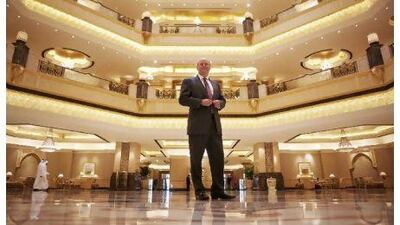Royal Bank of Scotland (RBS), the banking giant that was taken over by the British government after recording the biggest loss in UK corporate history, is ready to be privatised once more, says the bank's chief executive.
On the first leg of a tour of Gulf states, Stephen Hester told The National the bank had cleaned up its balance sheet and resolved the problems that brought it to the brink of collapse in 2009.
"I'd be happy if the government started selling shares today," Mr Hester said yesterday in Abu Dhabi. "We're ready to stand on our own two feet."
The process of privatising the bank would be unlikely to start until regulatory changes to the British banking system were complete, and the timing of any share sale would ultimately be decided by the UK government, he added. But he said he hoped it could get under way next year.
"I'd be disappointed if the process of reprivatisation didn't start some time in 2012," he said.
As he embarked on a tour of Abu Dhabi, Dubai, Qatar and Kuwait, Mr Hester said interest from government funds based in the Gulf would be "terrific" from the bank's point of view.
However, it is important to "keep up our contacts with investors" in the region, he said.
"The Middle East is the location of a large amount of investment capital … RBS is a partially government-owned bank which one of these days will want to have a broader shareholding base," he said.
Mr Hester also confirmed a recently revealed investment from the Libyan Investment Authority had been frozen.
The Libyan regime's sovereign wealth fund had deposited US$110.1 million (Dh404.4m) in the RBS Special Opportunities Fund, according to a leaked document obtained by the advocacy group Global Witness.
At the time the documents were written in June last year, the value of the investment had fallen to $74.4m.
"We have had some modest amount of Libyan assets, which pursuant to the UK government policy, are now frozen," Mr Hester said.
The UK government froze assets linked to the Libyan leader Muammar Qaddafi and his family this year.
RBS, headquartered in Edinburgh, Scotland, was 83 per cent nationalised by the British government in 2009. The bank recorded losses of £24.1 billion (Dh145.81bn) for 2008, the bulk of which came from a writedown of its stake in ABN Amro, acquired the year before.
RBS' balance sheet increased in the years preceding the financial crisis, becoming at one point the biggest company in the world by total assets, according to the Global 2000 list of companies compiled by Forbes magazine in 2008.
The bank is not as large today after its attempts to take risky investments off its balance sheet.
Among the asset sales RBS conducted was that of its UAE retail banking business to Abu Dhabi Commercial Bank last year.
The UK government also owns a 41 per cent stake in Lloyds Banking Group, which it also bailed out after the bank was forced to merge with HBOS.
The government's stakes in both banks are now managed by UK Financial Investments, alongside its stakes in Northern Rock and Bradford and Bingley.
Qatar has indicated a desire to take part in the privatisation of RBS and Lloyds Banking Group.
The Independent Commission on Banking is due to make a recommendation to the UK government on how to make structural reforms in the country's banking sector to promote financial stability and competition.
The commission is due to report by the end of September.

